OCAML FROM THE VERY BEGINNING
In OCaml from the Very Beginning John Whitington takes a no-prerequisites approach to teaching a modern general-purpose programming language. Each small, self-contained chapter introduces a new topic, building until the reader can write quite substantial programs. There are plenty of questions and, crucially, worked answers and hints.
OCaml from the Very Beginning will appeal both to new programmers, and experienced programmers eager to explore functional languages such as OCaml. It is suitable both for formal use within an undergraduate or graduate curriculum, and for the interested amateur.
JOHN WHITINGTON founded a software company which uses OCaml extensively. He teaches functional programming to students of Computer Science at the University of Cambridge.
OCAML from the very beginning John WhitingtonC O H E R E N T P R E S SC O H E R E N T P R E S S
Cambridge Published in the United Kingdom by Coherent Press, Cambridge Coherent Press 2013 This publication is in copyright. Subject to statutory
exception no reproduction of any part may take place
without the written permission of Coherent Press. First published June 2013
Reprinted with corrections October 2013 A catalogue record for this book is available from the British Library
Contents
Preface
This book is based on the Authors experience of teaching programming to students in the University of Cambridge supervisions system. In particular, working with students for the first-year undergraduate course Foundations of Computer Science, based on Standard ML and lectured for many years by Lawrence C. Paulson.
An interesting aspect of supervising students from a wide range of backgrounds (some with no previous experience at all taking Computer Science as an additional subject within the Cambridge Natural Sciences curriculum, and some with a great deal of programming experience already) is the level playing field which the ML family of languages (like OCaml) provide. Sometimes, those students with least prior programming experience perform the best.
I have tried to write a book which has no prerequisites and with which any intelligent undergraduate ought to be able to cope, whilst trying to be concise enough that someone coming from another language might not be too annoyed by the tone.
Special note to those who have already written programs
When I was a boy, our class was using a word processor for the first time. I wanted a title for my story, so I typed it on the first line and then, placing the cursor at the beginning, held down the space bar until the title was roughly in the middle. My friend taught me how to use the centring function, but it seemed more complicated to me, and I stuck with the familiar way after all, it worked. Later on, of course, when I had more confidence and experience, I realized he had been right.
When starting a language which is fundamentally different from those you have seen before, it can be difficult to see the advantages, and to try to think of every concept in terms of the old language. I would urge you to consider the possibility that, at the moment, you might be the boy holding down the space bar.
Acknowledgments
Inevitably, the approach here owes a debt to that taken by Lawrence C. Paulson, both in his lecture notes and in his book ML for the Working Programmer (Cambridge University Press, 1996). Question 3 in Chapter 11 is inspired by an examination question of his. I was taught Standard ML by Professor Paulson and Andrei Serjantov in Autumn 2000. Mark Shinwell has been a constant source of helpful discussion. Robin Walker and latterly Andrew Rice have arranged the supervisions system at Queens College within which I have taught since 2004. I am grateful to the developers of OCaml who have provided such a pleasant environment in which to write programs. Helpful comments on an earlier draft were provided by Martin DeMello, Damien Doligez, Arthur Guillon, Zhi Han, Robert Jakob, Xavier Leroy, Florent Monnier, and Benjamin Pierce. And, of course, I thank all my students, some of whom are now working with OCaml for a living.
Getting Ready
This book is about teaching the computer to do new things by writing computer programs . Just as there are different languages for humans to speak to one another, there are different programming languages for humans to speak to computers.
We are going to be using a programming language called OCaml . It might already be on your computer, or you may have to find it on the internet and install it yourself. You will know that you have OCaml working when you see something like this:
OCaml
#
OCaml is waiting for us to type something. Try typing 





 followed by the Enter key. You should see this:
followed by the Enter key. You should see this:
OCaml
# 1 + 2;;
- : int = 3
OCaml is telling us the result of the calculation. To leave OCaml, give the exit 0 command, again ending with ;; to tell OCaml we have finished typing:
OCaml
# exit 0;;
You should find yourself back where you were before. If you make a mistake when typing, you can press  (hold down the
(hold down the  key and tap the
key and tap the  key). This will allow you to start again:
key). This will allow you to start again:
OCaml
# 1 + 3^CInterrupted
# 1 + 2;;
- : int = 3
We are ready to begin.
Chapter 1
Starting Off
We will cover a fair amount of material in this chapter and its questions, since we will need a solid base on which to build. You should read this with a computer running OCaml in front of you.
Consider first the mathematical expression 1 + 2 3. What is the result? How did you work it out? We might show the process like this:

How did we know to multiply 2 by 3 first, instead of adding 1 and 2? How did we know when to stop? Let us underline the part of the expression which is dealt with at each step:

We chose which part of the expression to deal with each time using a familiar mathematical rule multiplication is done before addition. We stopped when the expression could not be processed any further.
Computer programs in OCaml are just like these expressions. In order to give you an answer, the computer needs to know all the rules you know about how to process the expression correctly. In fact, 1 + 2 3 is a valid OCaml expression as well as a valid mathematical one, but we must write * instead of , since there is no key on the keyboard:
OCaml
# 1 + 2 * 3;;
- : int = 7
Here, # is OCaml prompting us to write an expression, and 1 + 2 * 3;; is what we typed (the semicolons followed by the Enter key tell OCaml we have finished our expression). OCaml responds with the answer . OCaml also prints int , which tells us that the answer is a whole number, or integer .
Let us look at our example expression some more. There are two operators : + and . There are three operands : 1, 2, and 3. When we wrote it down, and when we typed it into OCaml, we put spaces between the operators and operands for readability. How does OCaml process it? Firstly, the text we wrote must be split up into its basic parts: , + , , * , and . OCaml then looks at the order and kind of the operators and operands, and decides how to parenthesize the expression: (1 + (2 3)). Now, evaluating the expression just requires dealing with each parenthesized section, starting with the innermost, and stopping when there are no parentheses left:
Next page
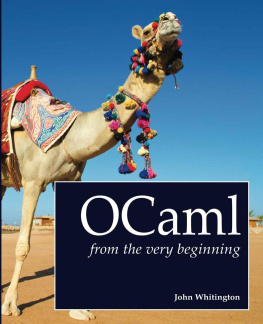
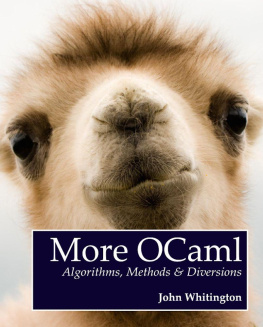
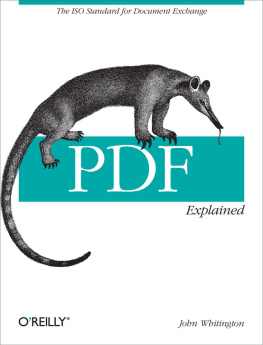

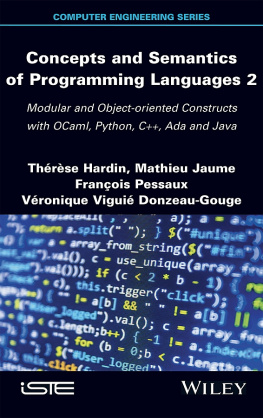
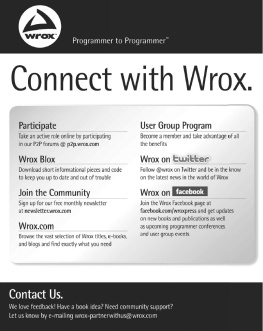
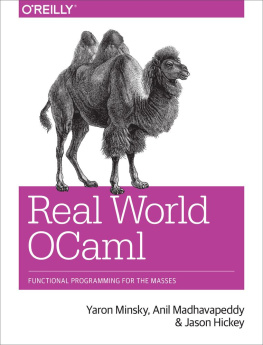
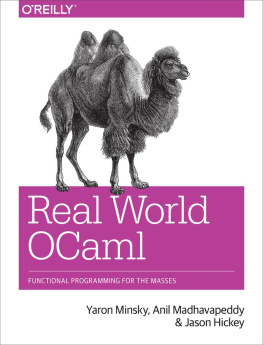
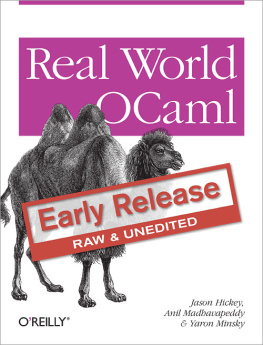
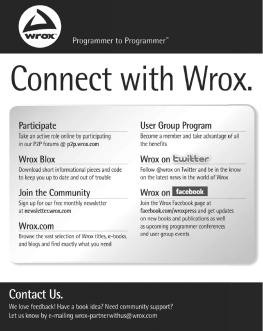






 followed by the Enter key. You should see this:
followed by the Enter key. You should see this: (hold down the
(hold down the  key and tap the
key and tap the  key). This will allow you to start again:
key). This will allow you to start again:
